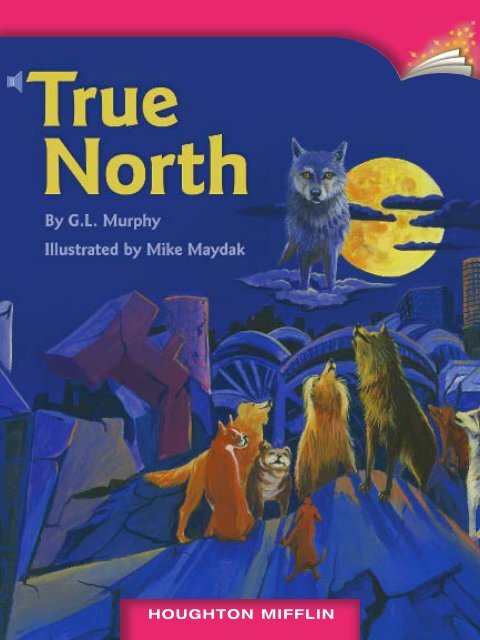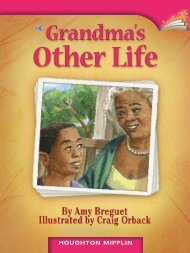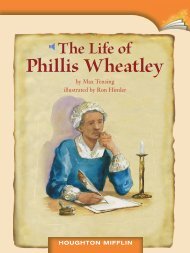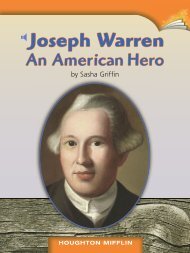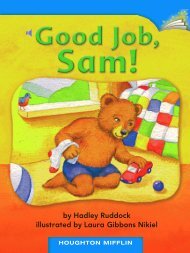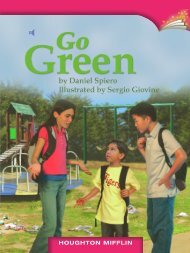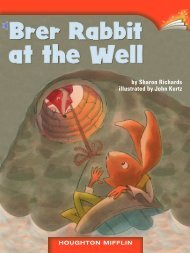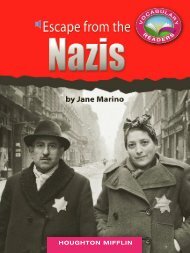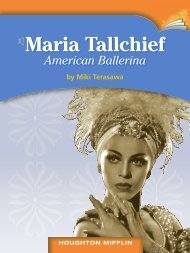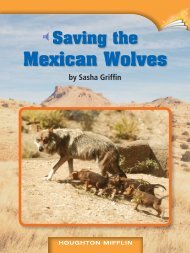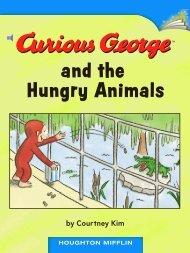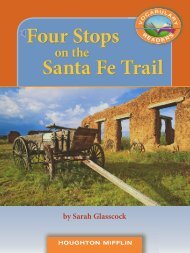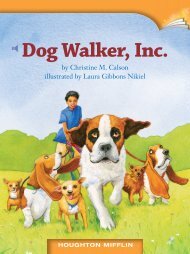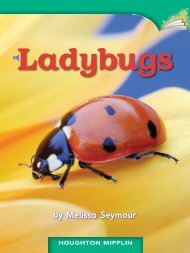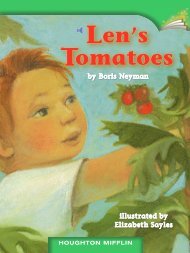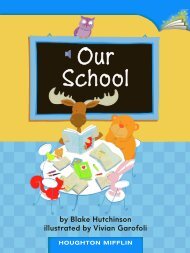Lesson 12:True North
Lesson 12:True North
Lesson 12:True North
- No tags were found...
You also want an ePaper? Increase the reach of your titles
YUMPU automatically turns print PDFs into web optimized ePapers that Google loves.
By G. L. MurphyIllustrated by Mike MaydakCopyright © by Houghton Mifflin Harcourt Publishing CompanyAll rights reserved. No part of this work may be reproduced or transmitted in any form or by any means, electronic ormechanical, including photocopying or recording, or by any information storage and retrieval system, without the priorwritten permission of the copyright owner unless such copying is expressly permitted by federal copyright law. Requestsfor permission to make copies of any part of the work should be addressed to Houghton Mifflin Harcourt School Publishers,Attn: Permissions, 6277 Sea Harbor Drive, Orlando, Florida 32887-6777.Printed in ChinaISBN-13: 978-0-547-02<strong>12</strong>2-5ISBN-10: 0-547-02<strong>12</strong>2-41 2 3 4 5 6 7 8 0940 18 17 16 15 14 13 <strong>12</strong> 11If you have received these materials as examination copies free of charge, Houghton Mifflin Harcourt School Publishersretains title to the materials and they may not be resold. Resale of examination copies is strictly prohibited.Possession of this publication in print format does not entitle users to convert this publication, or any portion of it, intoelectronic format.
The faithful dog had tried to climb inside the family carbut Frank McCarthy, his master, blocked him. “Sorry, boy,”Frank had said as he put his hand on Buck’s head. “We can’ttake you with us, not this time. The shelters don’t allow pets.You’re just going to have to make it on your own.”Within hours, the hurricane hammered the city. Fiercewinds blew down power lines, toppled trees, and flattenedall but the sturdiest buildings. The ocean flooded the city’sneighborhoods, with tsunami-size waves sweeping up tonsof debris. When it was over, what was left of the city was nowcompletely cut off from the mainland. The only survivors werethose animals that had taken refuge on high ground.Buck was one of those animals. So were dozens of otherabandoned dogs. Since most of Towerville’s infrastructure wasdestroyed and its human population had left, the dogs had nochoice but to fend for themselves. With his old, familiar worldseemingly washed away forever, Buck was sure of at least onething — from now on, he would have to fight tooth and nail forwhat was his.3
Chapter Two: The RivalsThe storm eventually subsided. During the days and weeksthat followed, the dogs’ instincts, blunted from generations ofliving with humans, began pushing their way to the surfaceand slowly guiding the dogs in their daily efforts to survive.One of the first signs of this change was the formation ofpacks. Buck, a natural leader, took charge of eight other dogs.His new family included a slobbering bulldog named Farley; aquick-tempered boxer named Clive; three nameless mutts thatbarely escaped from an animal rescue shelter; Bard, a bordercollie; Lucinda, an Afghan; and Nina, a husky.Under Buck’s watchful eye, the pack raided overturneddumpsters, ransacked abandoned supermarkets, and nabbedthe occasional squirrel or raccoon. As their hunting skillsimproved, they gradually evolved into efficient predators,relying on teamwork to bring down their prey.Buck’s father had been a prize-winning Belgian sheepdog,his mother an outgoing, affectionate Collie. Buck had hismother’s herding instincts and his father’s proud, stubbornspirit. When he assumed leadership of the pack, Buck had noidea his courage and strength would be stretched to the limitand beyond.As resources dwindled, rivalry among the packs grewfiercer and more deadly. One morning, five weeks after thehurricane had struck, Buck’s pack picked up the scent of oneof the many odd sea creatures that had somehow survived on4
land after the storm. But another dog pack was already on thetrail of the frail creature. Its leader, Reno, was a born fighter.He never backed down from a conflict, and he had the scars toprove it.The two packs cornered their prey in a vacant lot. Thenthey closed in for the kill. Reno’s pack made the first chargewith Reno in the lead. His second-in-command blocked thecreature’s only exit. With lightning speed, Reno brought theanimal down. His underlings jostled each other for access tothe warm meal.5
Buck knew instinctively that the kill belonged to Reno andhis pack. But on this particular day, hunger was stronger thaninstinct. Against his better judgment, Buck led his dogs acrossthe rubbish-strewn lot toward the feasting dogs.Instantly, Reno was ready for combat. Every muscle in hisbody became taut. Facing Buck, he let out a low, throaty growlthat meant only one thing — come any closer and I’ll tear youapart, too.Buck’s human family had never driven him away fromthe table. They would even share portions of their meals withhim. But things were different now, and if he wanted to havefresh meat, he would have to fight for it and risk being badlymauled or even killed.The two leaders, with lowered heads and fangs visible,kept their eyes fastened on each other. Neither dog wouldinitiate an attack. Instead, they waited to see who wouldback down first. After nearly a minute of intense, butbloodless confrontation, Buck wisely decided that now wasnot the time to fight. He lifted his head and signaled to Renothat the creature was his, free and clear. Then Buck led hispack out of the lot and back to their haunt, a station housethat was located on the city’s subway lines to the mainland.6
Chapter Three: Conflict or Cooperation?A large saltwater bay separated the city from themainland. Before the hurricane, a suspension bridge stretchedacross the bay. But the severity of the storm had snapped thecables holding up the bridge, plunging it into the swirling graywaters below.The station house that Buck’s pack now called home hadbeen boarded up. It was the last stop before the rapid transittrain embarked on its miles-long journey under the bay.7
Once powered by enormous electromagnets, the high-speedtrain, nicknamed “The Arrow,” had made its last trip throughthe tunnel on the morning of the hurricane.A few days after his near-brawl with Reno, Buck led hispack on another hunt for food. This time, they found barelyenough for one modest meal. It was clear to Buck that if heand his pack were going to survive, they would need to sharewhatever resources they had.But each pack had established its own territory within thecity and was prepared to fight to the death to keep rival packsout. Buck’s pack was no exception. The only difference wasBuck’s dawning awareness that this arrangement could notlast forever.On his own, Buck caught one of these odd sea creatures.But instead of eating it or sharing it with his pack, Buck didsomething no other dog, as far as he knew, had ever done — hecarried it to his enemy as a kind of offering and waited for Renoto appear. When the bigger and more powerful dog finallyshowed up, Buck nudged the dead creature toward him andthen sat down. At first, Reno didn’t know what to make of hisrival’s strange behavior.Buck backed up and this time lay down on the ground,hoping to assure Reno that he meant no harm. Reno got themessage and quickly seized the carcass, relishing the gift ashe carried it back to his encampment. Buck hoped this gestureof reconciliation would be the first step in ending the dogs’bitter rivalry.8
Chapter Four: The DiscoveryUnfortunately, hunger, exhaustion, and now diseasefrom contaminated water were beginning to take their toll.Few dogs were in any kind of shape to resist their own mostviolent instincts.Then one night, Lucinda, one of Buck’s pack mates,made a discovery that promised to end the dogs’ long ordeal.The Afghan relished hunting for small animals on her own.On her way to a swampy area that had once been a smallpublic park, she spotted a crack in the pavement — a placewhere the road had caved in from the effects of the storm.Moonlight drilling into the fissure allowed Lucinda to see,about 30 feet below the surface, a jumble of concrete blocks andiron rods. She also detected the silvery side of an overturnedsubway train.Old memories flickered in Lucinda’s mind. She recalledthe many times her family had taken her with them on“The Arrow” when they visited the mainland. With thesememories came a deep yearning for the way things used tobe. She wanted to be home — home with her human family.The sleek Afghan raced back to the station and barkedincessantly until Buck and the others understood she wanted toshow them something.Lucinda led the pack toward her find. As soon as theyreached the opening, Buck understood the importance ofhis friend’s discovery. It could be their way out of a city thatshowed no signs of ever coming back to life.9
Buck widened the opening by digging out loose rocks anddirt. Then he started down. But only Lucinda followed him.The other dogs, especially Farley the aging bulldog, weren’tsure this was a wise course of action. Whining, yelping, andbarking, they resisted going any farther. Buck came back upand tried to herd them into the opening. When this didn’t work,he gently nipped their legs. But this tactic failed, too.As bad as things were, even worse was their fear of theunknown. What if conditions were even worse elsewhere?What if rival dogs weren’t the worry, but bigger, meanerpredators? Buck sensed this opening was their only hope, andhe would have to find some way to persuade Farley and theothers to join him. Otherwise, they would have to struggle likefilthy scavengers, like the circling birds that were more andmore common. But that night, with the moon slowly creepingover a skyline of dark, vacant, broken skyscrapers, Buck didn’tknow what to do next.10
Feeling thwarted, he and Lucinda led the pack back to thestation house. Each dog curled up in his or her favorite spot andsoon fell asleep. Since the storm, Buck’s dreams had becomeeven more vivid and lucid. He had no way of knowing just howunusual they were. That night he dreamed of what they wouldfind on the mainland. Instead of office buildings and streetsclogged with cars, Buck saw endless wilderness and boundlessfreedom. In the wilderness of Buck’s dream, dogs lived asdogs — not as household pets, playthings for children, orcompanions for the lonely, the bereaved, the impaired. And notas rivals, fighting over scraps.Waking up long before sunrise, Buck wanted to share hisdream with the pack. Surely, he thought, if there were sucha wilderness waiting for them, shouldn’t they start looking forit as soon as possible? He knew that if he was going to convincethem to come with him, he would have to appeal to their truestinstincts, to remind them of their birthright, their ancientorigins as noble creatures of the wild.It was then that Buck remembered seeing a wolf forthe first and only time in his life. His family had taken himon a camping trip. Buck was about one year old at the time.While exploring the woods on his own, he came face to facewith the biggest animal he had ever encountered.11
The wolf seemed as startled as Buck was. For a moment,the two just stared at each other. Buck saw something in thewolf’s eyes he had never seen in any other pair of eyes, humanor animal. Then, in a flash, the wolf was gone. It had vanishedinto the surrounding green. But the look in his eyes stayed withBuck. It told him now that another world was possible.Buck stood up on the station floor and began to howl.His howls became gradually fuller and deeper. They burroweddown into each dog’s most essential nature and tappedsomething so basic, so primitive, they could only reply inkind. One by one, the dogs answered Buck’s call with a callof their own till the entire pack was howling as one wild andglorious wolfpack.<strong>12</strong>
Chapter Five: The EscapeInspired by the same urgent desire, the dogs rushedback to the site of the cave-in. As always, Buck took the lead.He guided the pack over the concrete blocks and into theplunging darkness. Then Buck began to falter. Should he tellReno and the other pack leaders about the passageway? Was itright to leave them marooned in the city?A stone fell at Buck’s feet. He looked up and saw Farleythe bulldog standing above him. Farley was the only memberof the pack who had not begun the descent. Their eyes met andlocked. Buck knew what the bulldog was telling him: “I can’tgo with you, Buck. I’d rather take my chances up here. At leastI know what to expect.”“Watch out for Reno,” Buck barked in return. “Keep himaway from here until we’ve had enough time to get away.Then show him the opening so he and the others can come,too.” Farley barked in reply that he would do his best to oblige— or die trying.Tons of shattered concrete from the cave-in blocked theentrance to the subway tunnel. But one of the mutts, a terrierand dachshund mix, found a narrow gap. One by one, the dogswriggled through the gap and entered a dimly lit passage.Buck was surprised to find light so far below ground.It came from a series of radiant panels along both sides of thepassage. The passage led to one of the stops on the subwayline. The platform where passengers once stood looked intact.13
Advertisements for the Olympic games still gleamed from thewalls. Steel rails snaked along, but with no train to ride them.Buck led the pack past the platform and deeper into the tunnel.The only sound, aside from the nervous panting of the dogs,was the ominous drip of water.Suddenly, Bard let out an ear-piercing yelp. Buck whippedaround to see what was wrong. A huge rat — bigger thanBuck had ever seen before — had attacked the supple collie.Other rats, their eyes like red-hot rivets, scurried from theirhideouts, ready to join the fray.The size and ferocity of the rats were more than the dogscould handle. But before the pack made its getaway, Ninayanked the rat off Bard’s shoulder. Then the big Husky flung itaway as far as she could. That was enough to keep the other ratsfrom attacking, at least for the moment. With his pack matesbehind him, Buck raced ahead, following the rails whereverthey led.14
The radiant side panels had lost much of their energy.As the light in the tunnel dimmed, the dogs becameincreasingly anxious. With frayed nerves, they wondered whatother dangers lay ahead.Buck was the first to notice the water. At the start of theirjourney, there had been just a couple inches of water. But nowthe floor of the tunnel was covered with six or more inches ofwater. It had a peculiar, brackish smell. Buck recognized thatsmell. It came from the sea. Buck didn’t know how the waterhad seeped into the tunnel. All he understood was the need tokeep going, no matter what.Up ahead, the tunnel curved to the right. A curiousblue light pulsed from the far side of the curve. Buck’s heartpounded. Had they reached the other side at last? Wouldthey find human workers repairing the tunnel or searchingfor missing people — and their abandoned pets? The waterdeepened. Some sort of slick plant life clung to the dogs as theyslogged their way forward.15
Rounding the bend, they saw the source of the light— a giant undulating blob. Blue light flashed from dozens oftwinkling tentacles streaming off the blob’s body. The light hada hypnotic effect on the dogs. Against their will, they driftedtoward it.Clive moved ahead of the others. A lean, muscularboxer, he bumped against one of the tentacles. Instantly, itzapped Clive with a jolt of electrical current. Clive jumpedback, whining.The dogs moved as far away from this giant jellyfish asthey could. Only Buck stayed where he was. He needed to see ifthe danger had passed.16
Chapter Six: To FreedomBuck suddenly became acutely aware that the water wasrising rapidly. The ocean tide was coming in. Without warning,a torrent of seawater, gushing through the tunnel, swept thejellyfish and the entire pack off their feet. Buck bobbed to thesurface and saw his buddies fighting to keep their heads abovewater as the current sent them careening down the tunnel.A few minutes later, they emerged from the tunnel andonto solid ground, like flotsam tossed on shore by a surgingsea. The jellyfish had disappeared.Nina, the husky, nudged Buck gently. She was telling him,“You did it, Buck! You got us out of the city. Now we can be free.”Buck wasn’t so sure. He didn’t see any signs of human life.The hurricane must have driven people farther inland. Thisdidn’t surprise him. But he had hoped to find the wildernessof his dreams, not a landscape full of washed out roads, dirtywater, and swampland. Buck’s heart sank like a rock. Thiswasn’t at all what he expected to find on the mainland.An unfamiliar sound interrupted the dogs’ mulling about.Looking up, they saw a low-flying aircraft. The dogs had neverseen such an aircraft before, and they didn’t know that the pilotwas searching for survivors. It didn’t matter, though. The sightof the aircraft meant that humans were alive, and could even benearby. Lucinda, the Afghan, had had enough of roughing it.17
Wanting nothing more than to return to the comforts ofa human home, she decided to leave the pack. Lucinda didn’tlook at the others, but just turned and headed south, toward thedirection where the aircraft had flown.Buck didn’t try to stop her. The main thing was to findthe place he was seeking, a place where he could be free, nolonger under the thumb of watchful humans or under attackby panicked rivals. But the call of freedom wasn’t the onlycall he heard. Deep down in his canine soul, Buck knew theplanet needed to find a new direction. The environment neededcareful stewardship. He would trust his instincts now andfollow them wherever they led.Buck barked loudly. Nina, Bard, and the others returnedhis bark, hesitantly at first. Buck barked again louder, stronger.The pack — Buck’s pack — replied, this time with moreassuredness. Buck barked a third time, telling them that it wastime to move on.To the north, a range of mountains rose up. The air smelledcrisp, cool, clean. There, Buck sensed, we’ll find our true home.18
RespondingTARGET SKILL Story Structure What wasthe main problem Buck faced in <strong>True</strong> <strong>North</strong>?What was the solution? Copy and complete thechart below.Problem: ?Events: conflict withReno; ?Solution: ?Write About ItText to Text Think about a book or story youread that described a time when an animalacted on its instincts. Write two paragraphs,describing the event in your own words andyour feelings about it.19
TARGET VOCABULARYcareeningengulffalterfrailfrayedjostledrelishingsuppletautundulatingEXPAND YOUR VOCABULARYcataclysmelectromagnetsfissureflotsaminfrastructureTARGET SKILL Story Structure Examine detailsabout characters, setting, and plot.Write About ItTARGET STRATEGY Infer/Predict Use text cluesIn a famous quotation, Aung San Suu Kyi said,to figure out what the author means or what might“Please use your freedom to promote ours.”happen in the future.What freedoms do you value most? Why? Writea letter to the editor of a Burmese newspaperGENRE A fantasy is a story with details that could notexplaining the freedoms you have and why theyhappen but seem real.are important to you.20
Level: YDRA: 60Genre:FantasyStrategy:Infer/PredictSkill:Story StructureWord Count: 3,2296.3.<strong>12</strong>HOUGHTON MIFFLINOnline Leveled Books1031993


